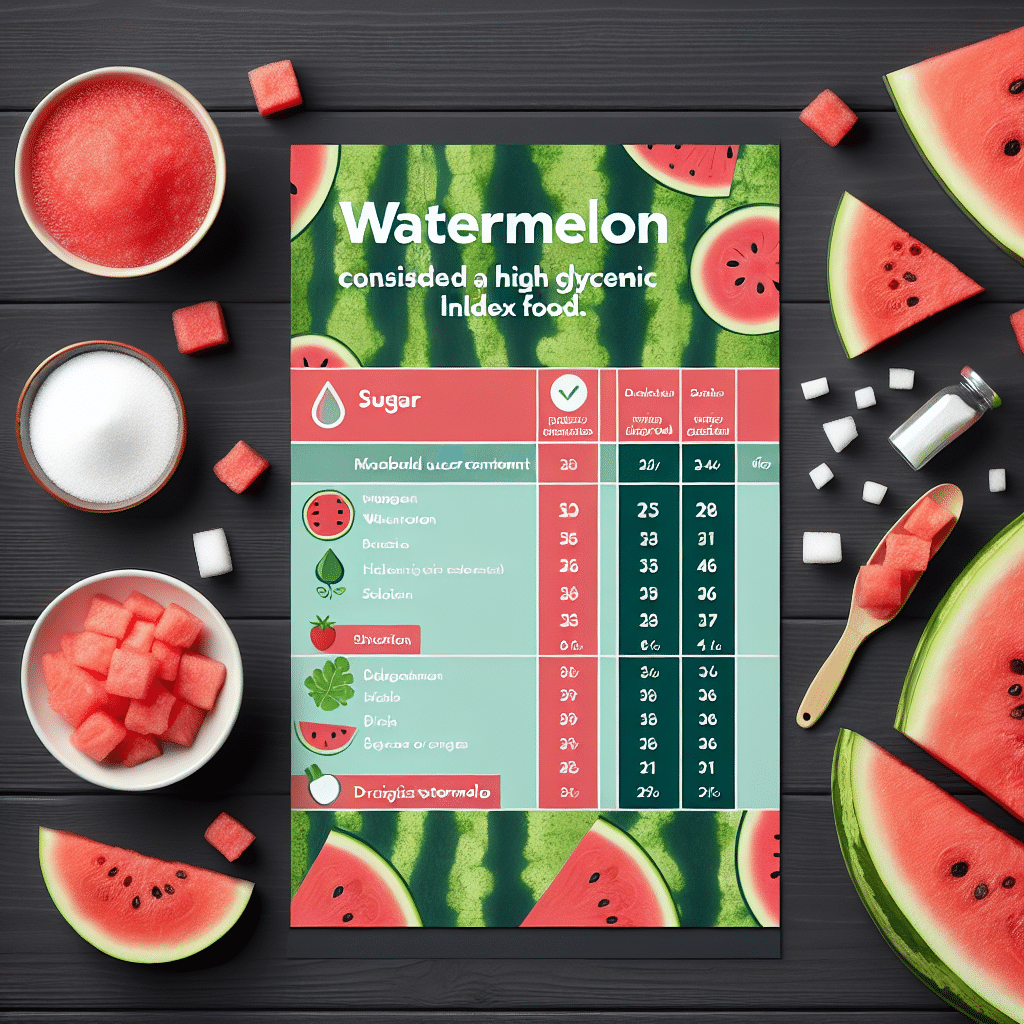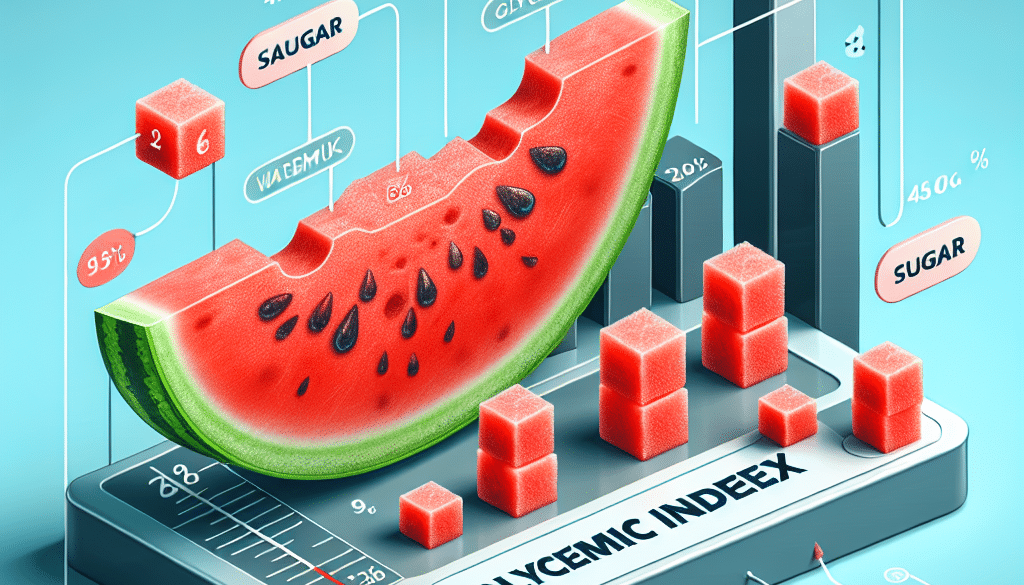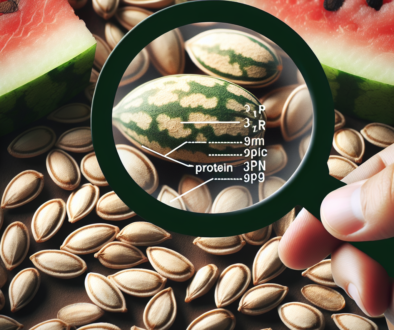Is Watermelon a High Glycemic Index Food? Sugar Facts
-
Table of Contents
- Watermelon and Glycemic Index: Understanding Sugar Content
- What is the Glycemic Index?
- Watermelon’s Glycemic Index
- Nutritional Profile of Watermelon
- Watermelon’s Sugar Content
- Impact on Blood Sugar Levels
- Case Studies and Research
- How to Include Watermelon in a Low-Glycemic Diet
- Conclusion: Balancing Enjoyment and Health
- Discover ETprotein’s Watermelon Seed Protein Products
Watermelon and Glycemic Index: Understanding Sugar Content

Watermelon is a refreshing and hydrating fruit that is often associated with summer picnics and beach outings. Its sweet taste and high water content make it a popular choice for a healthy snack. However, there is a common concern about the sugar content in watermelon and its impact on blood sugar levels, particularly for individuals with diabetes or those watching their carbohydrate intake. This article delves into whether watermelon is a high glycemic index food and provides insights into its sugar facts.
What is the Glycemic Index?
The glycemic index (GI) is a ranking system for carbohydrates based on their immediate effect on blood glucose (blood sugar) levels. Carbohydrates that break down quickly during digestion and release glucose rapidly into the bloodstream have a high GI. Conversely, carbohydrates that break down more slowly, releasing glucose more gradually into the bloodstream, have a low GI. The GI scale ranges from 0 to 100, with pure glucose set at 100 as a reference point.
Watermelon’s Glycemic Index
Watermelon has a glycemic index of around 72-80, which classifies it as a high GI food. However, the glycemic index does not take into account the portion size of the food consumed. This is where the concept of glycemic load (GL) comes into play. Glycemic load considers both the GI and the amount of carbohydrates in a serving. A GL of 10 or below is considered low, while a GL of 20 or above is considered high.
Despite its high GI, watermelon has a relatively low carbohydrate content, which results in a low glycemic load (approximately 7-8 for a standard serving size of 120 grams). This means that in typical serving sizes, watermelon does not significantly raise blood sugar levels.
Nutritional Profile of Watermelon
Watermelon is not only low in calories but also rich in vitamins, minerals, and antioxidants. Here’s a breakdown of its nutritional content:
- Vitamin C: A powerful antioxidant that supports immune function.
- Vitamin A: Important for eye health and immune function.
- Potassium: An essential mineral that helps regulate fluid balance and blood pressure.
- Lycopene: An antioxidant linked to heart health and cancer prevention.
- Amino acids: Watermelon contains citrulline, which may improve exercise performance and cardiovascular health.
Given its nutrient profile, watermelon can be a beneficial addition to a balanced diet.
Watermelon’s Sugar Content
Watermelon contains natural sugars, including fructose, glucose, and sucrose. A 100-gram serving of watermelon typically contains around 6-8 grams of sugar. While this may seem high, it’s important to consider the high water content of watermelon, which dilutes the concentration of sugar.
Impact on Blood Sugar Levels
For most people, eating watermelon in moderation will not cause a significant spike in blood sugar levels. However, individual responses to carbohydrate intake can vary, and those with diabetes or insulin resistance should monitor their blood sugar when consuming high GI foods like watermelon.
Case Studies and Research
Several studies have investigated the impact of watermelon consumption on blood sugar control. For instance, a study published in the “American Journal of Clinical Nutrition” found that the low glycemic load of watermelon makes it unlikely to have a major impact on blood glucose regulation when consumed in reasonable amounts.
How to Include Watermelon in a Low-Glycemic Diet
Even though watermelon has a high glycemic index, it can still be included in a low-glycemic diet by considering the following tips:
- Consume watermelon in moderation and be mindful of portion sizes.
- Pair watermelon with foods that have protein or healthy fats to slow down the absorption of sugar.
- Eat watermelon alongside a meal rather than as a standalone snack.
Conclusion: Balancing Enjoyment and Health
Watermelon is a high glycemic index food, but due to its low glycemic load, it does not typically cause a rapid increase in blood sugar levels when consumed in standard serving sizes. Its nutritional benefits and hydrating properties make it a valuable addition to a healthy diet. As with all foods, moderation is key, and individuals with specific dietary concerns should consult with a healthcare provider or a registered dietitian.
Discover ETprotein’s Watermelon Seed Protein Products
If you’re looking for a plant-based protein source that aligns with your health goals, consider ETprotein’s watermelon seed protein products. These high-quality protein powders are an excellent addition to any diet, providing essential amino acids without the added sugars found in many other protein sources.
ETprotein’s watermelon seed protein is perfect for smoothies, baking, or as a supplement to your meals. It’s a sustainable and hypoallergenic option that supports muscle growth, recovery, and overall health. Explore ETprotein’s range of products to find the perfect fit for your nutritional needs.
About ETprotein:
ETprotein, a reputable watermelon seed protein Chinese factory manufacturer and supplier, is renowned for producing, stocking, exporting, and delivering the highest quality organic bulk vegan protein and plant proteins. They include Organic rice protein, clear rice protein, pea protein, clear pea protein, watermelon seed protein, pumpkin seed protein, sunflower seed protein, mung bean protein, peanut protein etc. Their offerings, characterized by a neutral taste, non-GMO, allergen-free attributes, cater to a diverse range of industries. They serve nutraceutical, pharmaceutical, cosmeceutical, veterinary, as well as food and beverage finished product distributors, traders, and manufacturers across Europe, USA, Canada, Australia, Thailand, Japan, Korea, Brazil, and Chile, among others.
ETprotein specialization includes exporting and delivering tailor-made protein powder and finished nutritional supplements. Their extensive product range covers sectors like Food and Beverage, Sports Nutrition, Weight Management, Dietary Supplements, Health and Wellness Products, and Infant Formula, ensuring comprehensive solutions to meet all your protein needs.
As a trusted company by leading global food and beverage brands and Fortune 500 companies, ETprotein reinforces China’s reputation in the global arena. For more information or to sample their products, please contact them and email sales(at)ETprotein.com today.












